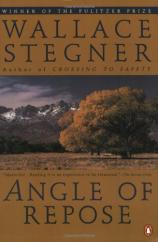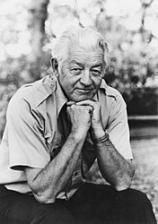Angle of Repose
About the Book
Angle of Repose
Wallace Stegner has said of his epic novel, "It's perfectly clear that if every writer is born to write one story, that's my story." It is a testament to the power of Stegner's prose and vision that Angle of Repose, winner of the 1972 Pulitzer Prize for fiction, can be appreciated as America's story as well. Based on the correspondence of the little-known 19th century writer, Mary Hallock Foote, the novel's heroes represent opposing but equally strong strains of the American ideal. Susan Burling Ward is refined, educated, and strong-willed. Her husband, Oliver, is a handsome adventurer of cruder habits, who brings a pistol when he comes courting, yet who is humbled in the presence of Susan's sophistication. As we follow Susan on her first journey across the young country—"not to join a new society but to endure it"—we experience the West through the eyes of a true easterner, horrified at the lack of culture, the quickly fabricated cities, the dust, dirt and heat. Susan eventually finds herself able to appreciate the raw beauty of her new surroundings, and is even successful in building comfortable homes for her family. Yet throughout her married life she defines herself through her east coast roots, debating Oliver's worthiness as a husband and provider, and assessing what she has given up in exchange for a life of adventure and uncertainty.
In Susan and Oliver's numerous disappointments and incidents of misfortune we find Stegner exposing the myth of America's west as a land of golden opportunity and fear less cowboys. It is a theme we find in many of his novels, along with a passionate appreciation of the western landscape. Indeed, Stegner's most magnificent writing can be found in his descriptions of the mountain peaks, deep canyons, winding ravines, and vast stretches of plain and prairie. The terrain becomes a character in its own right, deserving of fear and respect, forcing its will on the people who carve their homes out of its resistant rock and soil. But we must not label Stegner merely a regional writer. To do so would overlook his technical brilliance, which shines through in this novel in his choice of narrator: retired historian Lyman Ward, whose degenerative bone disease has confined him to a wheelchair and left him unable to move his head from side to side. Lyman's literal tunnel vision elucidates the figurative—as an historian he looks to the past, and as a disillusioned husband and father, he finds solace in it. But, as he discovers in the course of researching his grandmother's biography, even he cannot escape the present and some measure of self-examination.
Without Lyman's narrative input, Susan Burling Ward's story would have flattened into epic melodrama; his perspective broadens the novel's scope, and enables us to draw parallels between Susan's life and his own, between her century and ours. Although the term 'angle of repose' refers to a resting point, Stegner's novel, if nothing else, helps us recognize America as a nation in constant flux, engaged in incessant struggle between east and west, between young and old, between myth and reality, between reaching for one's dreams, and settling for less. Angle of Repose was written during a time of tremendous political and social upheaval in America, and Lyman's frequent reflections on the era create much of the tension in the novel. Yet some twenty years after its publication the character's personal histories continue to be relevant and edifying. They are America's stories, part of her past and present—undoubtedly part of her future.
Angle of Repose
- Publication Date: May 1, 1992
- Paperback: 569 pages
- Publisher: Penguin (Non-Classics)
- ISBN-10: 014016930X
- ISBN-13: 9780140169300










